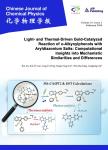Generalized Fourth-Order Decompositions of Imaginary Time Path Integral:Implications of the Harmonic Oscillator
虚时路径积分的广义四阶拆分方法及其谐振子分析作者机构:College of Chemistry and Center for Advanced Quantum StudiesKey Laboratory of Theoretical and Computational PhotochemistryMinistry of EducationBeijing Normal UniversityBeijing 100875China Institute of Condensed Matter and Material PhysicsSchool of PhysicsPeking UniversityBeijing 100871China Beijing National Laboratory for Molecular SciencesInstitute of Theoretical and Computational ChemistryCollege of Chemistry and Molecular EngineeringPeking UniversityBeijing 100871China
出 版 物:《Chinese Journal of Chemical Physics》 (化学物理学报(英文))
年 卷 期:2022年第35卷第3期
页 面:516-536,I0003页
核心收录:
学科分类:080701[工学-工程热物理] 08[工学] 0807[工学-动力工程及工程热物理] 0703[理学-化学] 0702[理学-物理学]
基 金:supported by the National Natural Science Foundation of China(No.21961142017,No.22073009 and No.21421003) the Ministry of Science and Technology of China(No.2017YFA0204901)
主 题:Path integral Decomposition Partition function Harmonic oscillator
摘 要:The imaginary time path integral formalism offers a powerful numerical tool for simulating thermodynamic properties of realistic *** show that,when second-order and fourth-order decompositions are employed,they share a remarkable unified analytic form for the partition function of the harmonic *** are then able to obtain the expression of the thermodynamic property and the leading error terms as *** order to obtain reasonably optimal values of the free parameters in the generalized symmetric fourth-order decomposition scheme,we eliminate the leading error terms to achieve the accuracy of desired order for the thermodynamic property of the harmonic *** a strategy leads to an efficient fourth-order decomposition that produces thirdorder accurate thermodynamic properties for general systems.



